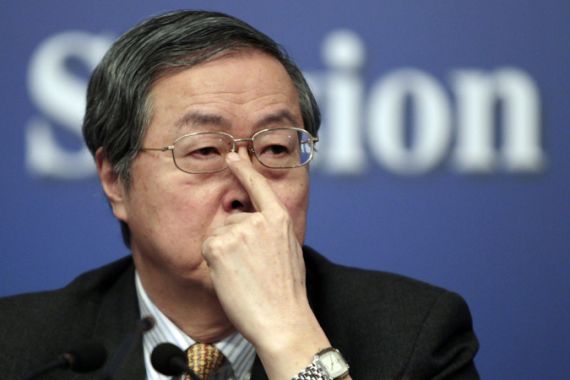China officials to skip IMF meetings in Japan
Cancellations by bank governor and finance minister come as two nations remain at odds over islands in East China Sea.

China’s central bank governor and finance minister have withdrawn from upcoming International Monetary Fund (IMF) and World Bank meetings being held in Japan.
Japan said on Wednesday that the cancellations, which come as the two Asian giants remain at odds over a cluster of tiny islands in the East China Sea, were “very regrettable”.
Keep reading
list of 4 itemsUS imposes new sanctions on Iran after attack on Israel
A flash flood and a quiet sale highlight India’s Sikkim’s hydro problems
Why is Germany maintaining economic ties with China?
A Japanese Finance Ministry official, who spoke on condition of anonymity due to the the sensitive nature of the matter, told the AP news agency that Zhou Xiaochuan, the governor of the People’s Bank of China, who was scheduled to give the event’s closing speech on Sunday, would not be going to Tokyo.
The official said that Finance Minister Xie Xuren had also cancelled his trip to take part in the IMF-World Bank annual meetings.
The IMF confirmed that Zhou had pulled out, citing scheduling problems, but could not confirm whether Xie had also cancelled his trip.
The IMF said Zhou’s deputy, Yi Gang, will represent him at the meeting and will deliver Sunday’s lecture.
“If the financial representatives were to decide not to attend the important meeting to be held in Tokyo, I find it very regrettable,” said Osamu Fujimura, Japan’s chief cabinet secretary,
“However, the bilateral economic relationship is valuable, so it is Japan’s intention to communicate effectively with China.”
Al Jazeera’s Divya Gopalan, reporting from Hong Kong, said that the meetings are important for Japan, which is hosting the event for the first time.
“China is taking a stance and it is somewhat of a snub for Japan,” she said.
Bad for business
Last week, the Agricultural Bank of China and the Bank of Communications cancelled events connected to the meetings in Japan.
An official with the Tokyo branch of the Agricultural Bank of China told Dow Jones Newswires that it was the latest sign that a festering spat over the islands in the East China Sea is having a wider impact on bilateral, and now multi-lateral, ties.
The dispute has triggered widespread protests in China and attacks on Japanese-owned factories and shops, and also appears to be spilling over into the economic arena, threatening a shaky economic recovery in Japan after last year’s tsunami and nuclear disasters.
Sales of Japanese cars in China plunged in September, with Toyota saying its sales of new vehicles there fell 49 per cent from a year earlier to 44,100 vehicles. Honda’s sales sank 41 per cent to 33,931 vehicles.
Gas potential
Toyota and Honda dealerships were burned down in one Chinese city last month after Tokyo decided to nationalise the islets, called Senkaku in Japanese and Diaoyu in Chinese.
Japan controls the rocky outcroppings, surrounded by potentially large undersea natural gas fields and rich fishing grounds, but China and Taiwan also claim them.
The purchase from the islands private Japanese owners was meant to block a potentially more inflammatory plan by Tokyo’s nationalistic governor to buy and develop them.
The move nonetheless angered China, which warned of “serious consequences” and has sent marine surveillance ships near the islands in recent weeks.
China is Japan’s biggest trading partner, and economists warn that the dispute could erode Japan’s economic growth. Thousands of Chinese tourists have cancelled trips to Japan as a result of the issue.
China, with its growing middle class, was one of the emerging markets that Japanese companies were counting on to boost sales amid a long stagnation in their domestic market and sluggish global growth.